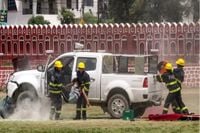As India gears up for a nationwide civil defence mock drill on May 7, 2025, the exercise is set against the backdrop of heightened security concerns following the tragic terror attack in Pahalgam that left 26 civilians dead on April 22. The drill, which involves 244 designated civil defence districts, aims to assess and enhance the nation’s preparedness for potential hostile attacks, simulating wartime scenarios such as air raid warnings and blackout protocols.
The Union Home Ministry issued a directive on May 5 to Chief Secretaries of all states and Union Territories to conduct this large-scale exercise. It is designed to improve the operational efficacy of civil defence measures across the country, emphasizing the importance of readiness in the face of threats.
Civil defence, as defined under the Civil Defence Act of 1968, is a government initiative to protect non-combatants from military attacks. The act established civil defence organizations in India, which are primarily manned by volunteers trained to respond to emergencies including natural disasters and terrorist attacks.
The upcoming mock drill will not only focus on urban areas but will also extend to village levels, ensuring comprehensive coverage. According to reports, nearly 300 civil defence districts, which include sensitive installations like nuclear plants, military bases, and refineries, will participate in the drill. The exercise is expected to involve various community stakeholders, including students and civil defence wardens, highlighting the collaborative nature of civil protection efforts.
In Kerala, Chief Secretary A Jayathilak has instructed all District Collectors to ensure the proper execution of the mock drill. Preparations were discussed in a meeting held on May 6, emphasizing the need for public cooperation and alertness during the exercise. Residents are advised to remain calm and follow instructions, such as switching off all lights and avoiding the use of mobile devices during the drill. At 4 PM, when the siren sounds, individuals should move to the safest part of their homes.
The drill will feature different signals: a long siren will indicate a warning, while a short siren will signify that it is safe to return to normal activities. Households are encouraged to prepare emergency kits with essential supplies, including torches and drinking water, to ensure safety during the blackout.
In the capital, Delhi, anti-terror mock drills are planned at over 50 locations, including schools and the Indira Gandhi International Airport. These exercises aim to reinforce security protocols following recent terror incidents and will be conducted in coordination with local authorities.
The significance of this nationwide drill cannot be understated, especially in light of the recent Pahalgam attack, which has reignited concerns over national security. The drill is part of a broader strategy to enhance civil defence capabilities and ensure that local responses are effective and well-coordinated.
Union Home Secretary Govind Mohan has been actively involved in overseeing the preparations for the mock drills, which are expected to evaluate various aspects of civil defence operations, including air raid warning systems and communication links with the Indian Air Force. The mock exercises will also test the functionality of control rooms and the readiness of volunteers.
Moreover, the civil defence mock drill is not just a theoretical exercise; it aims to provide practical training for civilians on how to protect themselves during emergencies. This includes the implementation of blackout measures and the early camouflaging of vital installations.
In Tamil Nadu, a specific drill will be conducted at the Madras Atomic Power Station and the Chennai Port Trust at 4 PM on May 7. The exercise will simulate conditions to check the preparedness of these critical facilities in the event of an air raid. Officials have reassured the public that normal operations will continue in other areas, and there is no cause for alarm.
As the nation prepares for this significant civil defence exercise, it is essential to recognize the role of community involvement in enhancing security and preparedness. Volunteers, students, and local organizations are crucial in ensuring that civil defence mechanisms are effective and responsive.
The Union Home Ministry's initiative reflects a commitment to strengthening India's civil defence infrastructure amidst rising security threats. The mock drill serves as a reminder of the importance of readiness and resilience in the face of potential crises.
Looking ahead, the outcomes of this nationwide drill will likely inform future civil defence strategies and enhance the overall safety of citizens. As India navigates these challenging times, the collective effort of government agencies and the public will be vital in maintaining national security and preparedness.







